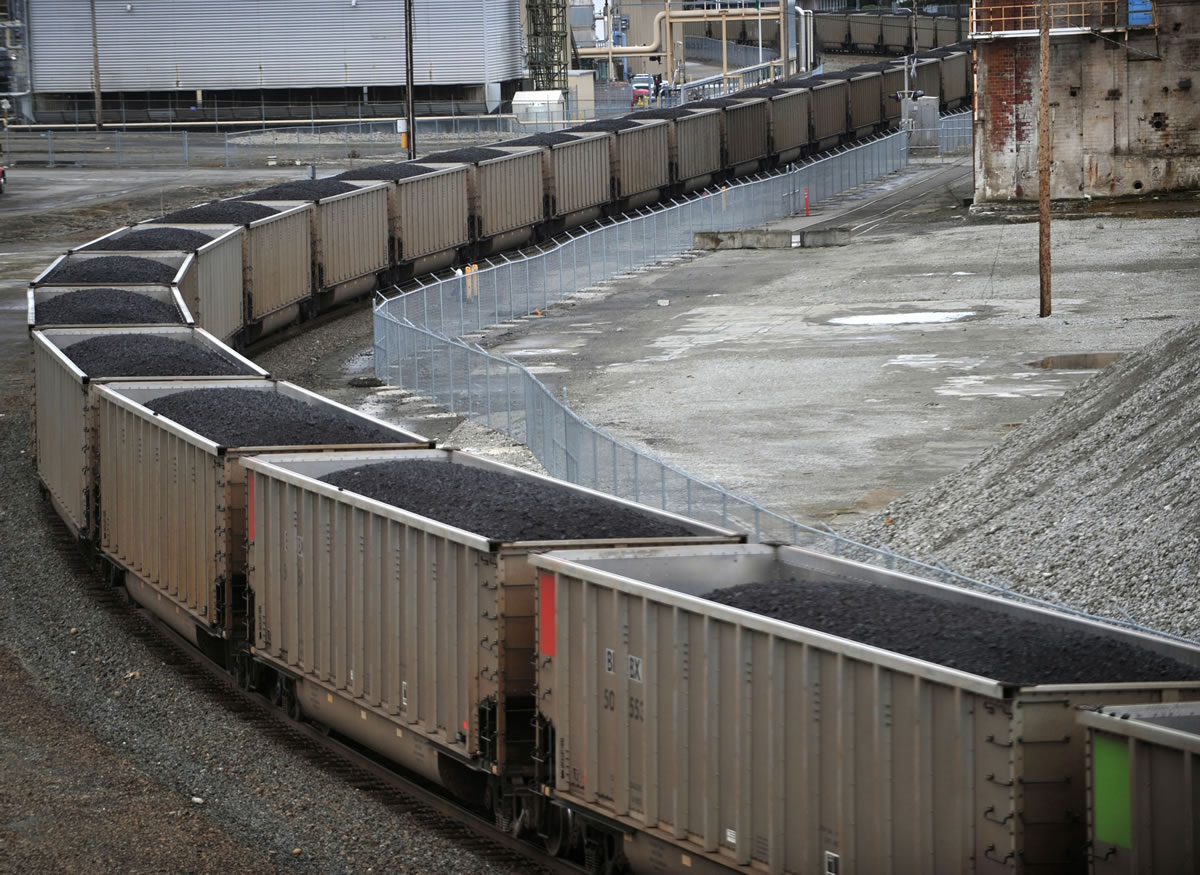FERNDALE — Gateway Pacific Terminal supporters showed up early and in force Thursday at a public meeting about what issues are worthy of study as regulators decide whether to grant permits for the coal export pier at Cherry Point.
By the time the meeting got under way at 3 p.m., coal terminal opponents may have been in the majority in the Ferndale Events Center crowd of more than 1,000, clad in red “Power Past Coal” shirts. But project backers were there first to get more of the 100 slots to testify at the microphone.
It was a bit of a turnabout from the Oct. 27 meeting in Bellingham, where opponents appeared to be the vast majority of the estimated 2,000 in attendance.
Many coal terminal supporters, in green “Let’s get to work” shirts, identified themselves as either labor union officials or members of construction and longshore unions expecting to get some work if SSA Marine of Seattle builds the $600 million project south of the BP Cherry Point refinery.
Among the first speakers in support of the project were Ferndale Mayor Gary Jensen and Lynden Mayor Scott Korthuis.
Jensen said the existing industries on the deep-water shoreline west of Ferndale have been good neighbors, running clean operations while providing jobs and tax revenue. Gateway Pacific could do the same.
“Our support for the project is not unconditional,” he said. “It never has been. We want them to be good neighbors like we have here now.”
Korthuis agreed, adding that the area has long been zoned for industrial development.
“Permitting agencies should not interfere with the lawful conduct of commerce,” he said.
Many terminal supporters urged the key regulatory agencies — Whatcom County, Washington Department of Ecology, and the U.S. Army Corps of Engineers — not to subject the project to the broad “programmatic” scrutiny of railroad and global climate impacts that environmental activists are demanding.
“I’m hoping that we can get through this process without a lot of convoluted processes added on to what we already have,” said Clarence Bob, an organizer with the Laborers Union.
Electrician Jim Groves agreed. “We need to study on the local issues,” he said. “I don’t care about butterflies on the Amazon or this programmatic thing.”
Many terminal backers saw no environmental damage severe enough to outweigh the economic benefits.
“I tell you quite frankly, folks, I don’t care what in the hell they build here, as long as it puts these folks to work,” said Robert Landon of Bellingham.
Neva Lowe of Ferndale brandished a lump of coal she’d found in her basement. “This area was founded on the coal industry,” Lowe said. “My home used to be heated with coal.”
Lorraine Newman of Bellingham said the anti-Gateway Pacific campaign was “fueled by Hollywood horror films and misinformation.”
“Do not let fear-mongers stop us from walking through this gateway to our future,” she said.
John Doornbos of Lynden argued that China and other industrial countries of Asia will burn coal from somewhere, no matter what happens in Whatcom County. “Those two forces of supply and demand will meet,” he said. “Let’s show the world that we can do this responsibly.”
Several speakers saw the movement to stop Gateway Pacific as a threat to freedom and prosperity.
“Individual freedom and the free flow of energy are the greatest means to reduce human suffering,” said Tom Williams of Ferndale, saying he wanted regulatory agencies to study what would happen if the “radical environmental movement” crushes the fossil fuel industry.
More than two hours after the 3 p.m. start of the meeting, the first Gateway Pacific opponent got a turn at the microphone.
David Culver said he and his wife moved to Whatcom County in 2006 and built a solar-powered home with an organic garden to support their vegetarian lifestyle. He urged the agencies to study the impact of coal dust from trains and the terminal itself, and require zero emissions of coal dust.
“Coal and coal dust is toxic to any living thing,” he said. “This toxic threat is not acceptable. If windblown coal dust cannot be mitigated, then this project is not acceptable.”
The terminal faces an estimated two years of a regulatory process while studies are compiled for an environmental impact statement. It would take perhaps two years to build, if permits are approved.
At maximum capacity, it could ship 54 million tons of bulk commodities a year, including 48 million tons of coal, to markets in Asia. Backers say it would generate millions in tax revenue, thousands of short-term construction jobs and more than 1,000 direct and indirect permanent jobs.
Opponents say the project would disrupt life in Bellingham and other places with excessive rail traffic that would snarl street crossings and cause health problems, while worsening climate change from coal-burning in Asia.



